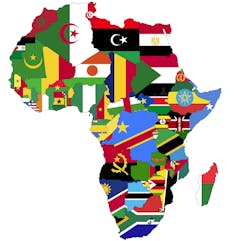 |
| Photograph by David E. Scherman / The LIFE Picture Collection / Getty |
CC™ Histofact Some 1.2 million African-American men served in the U.S. military during the war, but they were often treated as second-class citizens.
When the Selective Training and Service Act became the nation’s first peacetime draft law in September 1940, civil rights leaders pressured President Franklin D. Roosevelt to allow Black men the opportunity to register and serve in integrated regiments.
Although African-Americans had participated in every conflict since the Revolutionary War, they had done so segregated, and FDR appointee Henry Stimson, the Secretary of War, was not interested in changing the status quo. With a need to shore up the U.S. Armed Forces as war intensified in Europe, FDR decided that Black men could register for the draft, but they would remain segregated and the military would determine the proportion of Blacks inducted into the service.
The compromise represented the paradoxical experience that befell the 1.2 million African- American men who served in World War II: They fought for democracy overseas while being treated like second-class citizens by their own country.
Despite African-American soldiers' eagerness to fight in World War II, the same Jim Crow discrimination in society was practiced in every branch of the armed forces. Many of the bases and training facilities were located in the South, in addition to the largest military installation for Black soldiers, Fort Huachuca, located in Arizona. Regardless of the region, at all the bases there were separate blood banks, hospitals or wards, medical staff, barracks and recreational facilities for Black soldiers. And white soldiers and local white residents routinely slurred and harassed them.
“The experience was very dispiriting for a lot of Black soldiers,” says Matthew Delmont, a history professor at Dartmouth College and author of Black Quotidian: Everyday History in African-American Newspapers. “The kind of treatment they received by white officers in army bases in the United States was horrendous. They described being in slave-like conditions and being treated like animals. They were called racial epithets quite regularly and just not afforded respect either as soldiers or human beings.”
Because the military didn’t think African-Americans were fit for combat or leadership positions, they were mostly relegated to labor and service units. Working as cooks and mechanics, building roads and ditches, and unloading supplies from trucks and airplanes were common tasks for Black soldiers. And for the few who did make officer rank, they could only lead other Black men.
As Christopher Paul Moore wrote in his book, Fighting for America: Black Soldiers—The Unsung Heroes of World War II, “Black Americans carrying weapons, either as infantry, tank corps, or as pilots, was simply an unthinkable notion…More acceptable to southern politicians and much of the military command was the use of black soldiers in support positions, as noncombatants or laborers.”
African-American soldiers regularly reported their mistreatment to the Black press and to the NAACP, pleading for the right to fight on the front lines alongside white soldiers.
“The Black press was quite successful in terms of advocating for Blacks soldiers in World War II,” says Delmont. “They point out the hypocrisy of fighting a war that was theoretically about democracy, at the same time having a racially segregated army.”
In 1942, the Black newspaper, the Pittsburgh Courier—in response to a letter to the editor by James G. Thompson, a 26-year-old Black soldier, in which he wrote, “Should I sacrifice my life to live half American?"—launched the Double V Campaign. The slogan, which stood for a victory for democracy overseas and a victory against racism in America, was touted by Black journalists and activists to rally support for equality for African-Americans. The campaign highlighted the contributions the soldiers made in the war effort and exposed the discrimination that Black soldiers endured while fighting for liberties that African Americans themselves didn’t have.
As casualties mounted among white soldiers toward the final year of the war, the military had to utilize African-Americans as infantrymen, officers, tankers and pilots, in addition to remaining invaluable in supply divisions.
From August 1944 to November 1944, the Red Ball Express, a unit of mostly Black drivers delivered gasoline, ammunition, food, mechanical parts and medical supplies to General George Patton’s Third Army in France, driving up to 400 miles on narrow roads in the dead of night without headlights to avoid detection by the Germans.
The 761 Tank Battalion, became the first Black division to see ground combat in Europe, joining Patton’s Third Army in France in November 1944. The men helped liberate 30 towns under Nazi control and spent 183 days in combat, including in the Battle of the Bulge. The Tuskegee Airmen, the all-Black fighter pilot group trained at Tuskegee Institute in Alabama, escorted bombers over Italy and Sicily, flying 1600 combat missions and destroying 237 German aircraft on ground and 37 in air.
“Without these crucial roles that Blacks soldiers were playing, the American military wouldn’t have been the same fighting force it was,” says Delmont. “That was a perspective you didn’t see much in the white press.”
After World War II officially ended on September 2, 1945, Black soldiers returned home to the United States facing violent white mobs of those who resented African Americans in uniform and perceived them as a threat to the social order of Jim Crow.
In addition to racial violence, Black soldiers were often denied benefits guaranteed under the G.I. Bill, the sweeping legislation that provided tuition assistance, job placement, and home and business loans to veterans.
As civil rights activists continued to emphasize America’s hypocrisy as a democratic nation with a Jim Crow army, and Southern politicians stood firmly against full racial equality for Blacks, President Harry Truman signed Executive Order 9981 that desegregated the U.S. Armed Forces in July 1948. Full integration, however, would not occur until the Korean War.
HISTORY.COM


















